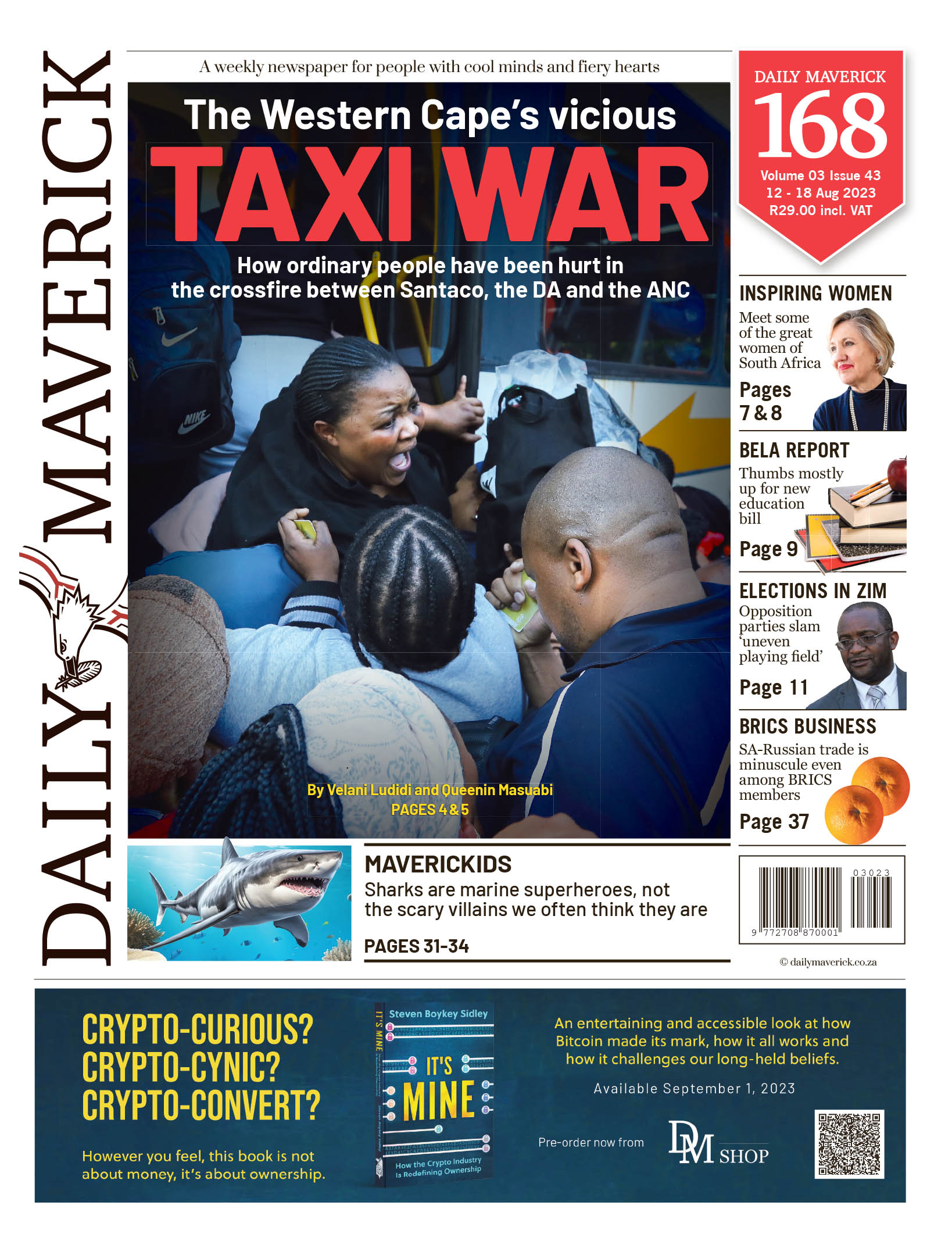When Western Cape members of the taxi association Santaco arrived at a meeting with the municipality and other officials carrying AK-47 rifles, the talks were called off immediately.
For the past week, taxi associations and drivers, angry at the application of the law and the impoundment of vehicles breaking the law, have held Cape Town’s workers to ransom.
Read more in Daily Maverick: Western Cape Taxi Strike
Thousands, most burdened with having to use public transport, were left stranded, far from their homes and families, many overnight.
Services most needed in these outlying areas closed, including clinics and schools.
Read more in Daily Maverick: Taxi strike impact — Matric learners threatened at rank, almost half a million blocked from Western Cape schools
The middle classes of the southern suburbs of Cape Town were generally unaffected and sailed around traffic-free highways and roads far from the smoke and the violence.
Most inconvenienced were domestic workers, gardeners, waiters, kitchen staff and cleaners who could not pitch up for work. Anyone who lived outside the immediate surroundings of the CBD was affected.
So far, estimates of earnings lost run into the billions. They always do. The burning buses and property, all of it, has a cost.
Born in need
If one needs to measure what South Africans think, the public broadcaster’s SAfm is one of the essential amplifiers of the national mood.
This week callers from across the country and across shows and time slots overwhelmingly lauded the attempted application of the law to an industry that in many regions acts as a mafia.
From Mpumalanga to the Eastern Cape, from Tshwane to Mangaung, listeners called in, united in condemnation of the taxi industry, the power it wields and its brazen violation of the law, in full view of the public and authorities daily.
The history of public transport in South Africa lies at the convoluted heart of what the taxi industry has morphed into: a semi-criminal enterprise. The political undercurrents, too, sully the landscape.
The forced removal of millions of black South Africans to racially designated areas outside major cities during the 1960s and 70s created a captive catchment of workers, stranded far from places of employment in white areas.
During a time of few economic opportunities, this government-created logjam opened up new business frontiers for township entrepreneurs. The organic growth of the taxi industry resulted in the deregulation of the industry in 1987.
Vast sums of money now circulate in the taxi economy and beyond. Transport is the backbone of the country’s economy and the single biggest financial cost to the lives of the poor.
One commuter on the newly restored central rail line said she paid R8 for her ticket as opposed to R18 for a taxi. Ruined rail networks have pushed commuters to more expensive forms of transport.
Who benefits from this? Follow the bodies, the money and the violence and it all points in one direction.
But remember also for a brief moment when taxis were heroes during the failed July insurrection, preventing looters from entering parts of downtown Durban.
Money talks in this industry, and money alone.
Collective gatvolness
South Africans have had their own ways of dealing with bullying public transport services from at least as far back as 1943.
Nelson Mandela was one of those who led this boycott of the buses after an unaffordable increase in fares was announced. The first strike in Alexandra township lasted nine days; the second, on the same issue, a whole seven weeks.
Fourteen years later, 1957 was a year still remembered by those who survive for the slogan “Azikhwelwa” (we shall not ride) echoing at protests during the Great Bus Boycott.
Ruth First, the academic and anti-apartheid activist who was blown to bits when state security sent a parcel bomb to her office at Eduardo Mondlane University in Maputo after a Unesco conference in 1982, wrote about that historic boycott.
In Fighting Talk, a political journal, she vividly described the sacrifices made by ordinary people to accomplish a collective goal.
“First the great lumbering green buses of the largest transport organisation for Africans in the country travelled empty along the route, later they were withdrawn altogether.”
She wrote how “for five and six hours every day endless streams of walkers filled the pavements”.
“Over the rise that obscures Alexandra Township from the main road came the eruption of workers in the dawn hours when mists and brazier fires mingle indistinguishably together.”
In the early evening, “the same crowds turned their backs on the city and again took to the roads”.
“Down the hill, the footsloggers found it easier (though by the tenth and eleventh weeks of the boycott, many shoes were worn to pitiful remnants), the spindly-legged youngsters trotted now and then to keep up… The progress of the weary women was slower still, here a large Monday washing bundle carried on the head, there a paraffin tin, or the baby tied securely to the back.”
Such was the resolve at the time. Unimaginable.
Unlikely bedfellows
Flip the script.
What if businesses in cities whose economies are being held hostage and are already haemorrhaging billions support the plight of staff and workers? Two days off, full pay, don’t use the taxis. Stay at home. Azikhwelwa!
Businesses could very easily leverage such power and there is no doubt that the idea of two days off on full pay in the middle of the week would not be an offer anyone would turn down. News would spread in half a second.
For once, taxi owners and operators might find themselves stranded, with no income. As it is, the industry generates some R90-billion a year. Any loss of earnings hurts.
Just a thought. DM
This story first appeared in our weekly Daily Maverick 168 newspaper, which is available countrywide for R29.




